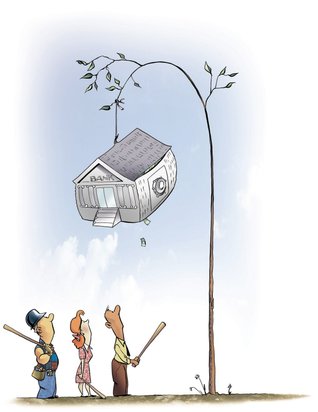Wednesday, Feb. 4, 2009 | 2 a.m.
Sun Archives
- Owner of two Nevada banks reports $148.3 million loss (1-30-2009)
- Nevada State Bank’s parent company reports $498.1 million loss (1-26-2009)
- Nevada State Bank to open four valley branches (1-23-2009)
- Carping about TARP (1-23-2009)
Last month, Nevada State Bank launched a marketing campaign to publicize its “renewed commitment to lending.”
“Your business needs a bank loan. We happen to be loaning,” the print ads stated. “A new economy starts now. And we’re ready to do our part.”
However, Nevada State Bank and other recipients of federal funding from the Treasury Department’s Troubled Assets Relief Program, or TARP, aren’t loaning enough to satisfy some critics who say financial institutions that benefitted from the taxpayer-funded program should be doing more to revive the economy.
These critics would like to see financial institutions that received the funds loosen their lending standards to aid local businesses.
But the banks’ executives say that amid declining demand for high-quality loans, if they were to lend more they could wind up making the same kinds of bad loans that contributed to the economic troubles in the first place.
Nevada State Bank — one of two Las Vegas community banks serving local businesses to have received TARP funds — saw its lending grow $20 million last quarter over the one before. Most of the loans came during the period before the bank received a $260 million cash infusion from TARP, part of the $1.4 billion the federal government paid to its parent company, Zions Bancorporation.
A Wall Street Journal study recently found that loans at 10 of the biggest TARP beneficiaries declined $46 billion, or 1.4 percent, from the third quarter to the fourth, when the funding was distributed.
Nevada State Bank’s lending practices have not changed, Chief Financial Officer Terry Shirey said. The bank was in a strong position to make loans before it received the new capital, he said.
A decrease in creditworthy borrowers has made lending more difficult, Shirvey said, and it would be unwise for the bank to lower its lending standards and risk creating more bad assets.
Las Vegas-based Western Alliance Bancorporation is in a similar position. It received $140 million from the federal government, of which $50 million went to Bank of Nevada in Las Vegas and $20 million went to a Reno-based bank.
In October, Western Alliance Chief Executive Robert Sarver told investors that the company had benefitted from being “one of the few banks in our markets that can make a loan.” It had just raised $50 million from investors at a time when raising money was difficult.
The bank planned to use the TARP funding to make “good-quality loans” and to hire bankers from other companies who have preexisting relationships with clients in order to boost deposits, Sarver said.
The bank had seen a steady stream of new wealthy clients request loans, Sarver said. “We’re getting calls from people that two, three, four years ago, we just couldn’t even get in to see or talk about doing business, let alone them coming to us and wanting to sign personally on credit,” Sarver said.
For the last few months of 2008, Western Alliance’s lending was up $149 million from the previous quarter. In Las Vegas during that period, Bank of Nevada’s lending rose $29 million.
But some local business leaders say they aren’t seeing that money. The local banks that have received government funding should be more lenient in their lending, rather than target the same good bets they were after before they received the taxpayer dollars, they say.
Dennis Smith, chief executive of Home Builders Research, said numerous home and apartment builders have halted construction because of financing problems with both regional and national banks.
“Instead of just doing business and looking at the bottom line, they should look at what’s going on in the economy and come up with some sort of adjustments,” Smith said.
Homebuilding has been one of the hardest hit segments of the economy amid widespread foreclosures that have created a glut of cheap homes. New home sales in Las Vegas were down 47 percent last year, and the 10,464 homes sold was the lowest number since 1988. Of the homes sold, 65 percent were bank-owned.
Smith predicts that picture will grow gloomier this year.
Despite the dismal numbers, homebuilders say banks should work with builders to finish the projects rather than pull out.
“They create so much distress instead of trying to work out something,” said Tom McCormick, president of Las Vegas-based homebuilder Astoria Homes. McCormick announced this week that the company would go on “hiatus” because of problems with financing.
Yet some analysts say the view that banks should be more flexible is shortsighted.
“We shouldn’t be forcing banks to make bad loans,” said Bert Ely, an independent bank analyst. “Many banks are just finding that there isn’t much in the way of good loan prospects out there as the economy shrinks and as the better borrowers are trying to de-leverage.”
The assumption that capital infusions from the government would necessarily lead to increased lending during a recession was based on faulty logic, Ely said.
“TARP was there to basically strengthen the capital foundation of the better-managed, stronger banks so that they could ride through this fiasco,” he said.


Join the Discussion:
Check this out for a full explanation of our conversion to the LiveFyre commenting system and instructions on how to sign up for an account.
Full comments policy